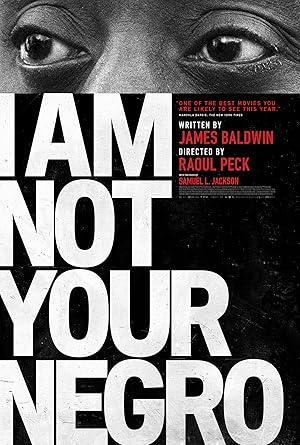
I Am Not Your Negro Page #3
Good morning, Tump.
The role
of the janitor is small,
yet the man's face
bangs in my memory until today.
- I have done nothing.
- Nobody says you have, Tom.
But they might.
The film's
icy brutality both scared me...
What for?
...and strengthened me.
Because Uncle Tom
refuses to take vengeance
in his own hands,
he was not a hero for me.
Heroes, as far as I could see,
where white,
and not merely
because of the movies,
but because of the land
in which I lived,
of which movies
were simply a reflection.
I despised
because they did take vengeance
into their own hands.
They thought vengeance
was theirs to take.
And, yes, I understood that:
my countrymen were my enemy.
I suspect that all these stories
that no crime was committed.
We've made a legend
out of a massacre.
Leaving aside
all the physical facts
which one can quote.
Leaving aside rape or murder.
Leaving aside the bloody catalog
of oppression,
which we are, in one way,
too familiar with already,
what this does
to the subjugated
is to destroy
his sense of reality.
This means, in the case
of an American negro,
born in that
glittering republic,
and in the moment you are born,
since you don't know any better,
every stick and stone
and every face is white,
and since you have not yet
seen a mirror,
you suppose that you are too.
around the age of five,
or six, or seven,
to discover that Gary Cooper
killing off the Indians,
when you were
rooting for Gary Cooper,
that the Indians were you.
to discover the country,
which is your birthplace,
and to which you owe
your life and your identity,
has not, in its whole system
of reality,
evolved any place for you.
I know how to do it,
technically.
It is a matter of research
and journeys.
And with you or without you,
I will do it anyway.
I begin in September,
when I go on the road.
"The road" means
my return to the South.
It means briefly, for example,
seeing Myrlie Evers,
and the children.
Those children
who are children no longer.
It means going back to Atlanta,
to Selma, to Birmingham.
It means seeing
Coretta Scott King,
and Martin's children.
I know that Martin's daughter,
whose name I don't remember,
and Malcolm's oldest daughter,
whose name is Attalah
are both in the theatre,
and apparently are friends.
It means seeing Betty Shabazz,
Malcolm's widow,
and the five younger children.
as one of the witnesses
to the lives and deaths
And it means much,
much more than that.
"A clod of witnesses,"
as old St. Paul once put it.
Translation
Translate and read this script in other languages:
Select another language:
- - Select -
- 简体中文 (Chinese - Simplified)
- 繁體中文 (Chinese - Traditional)
- Español (Spanish)
- Esperanto (Esperanto)
- 日本語 (Japanese)
- Português (Portuguese)
- Deutsch (German)
- العربية (Arabic)
- Français (French)
- Русский (Russian)
- ಕನ್ನಡ (Kannada)
- 한국어 (Korean)
- עברית (Hebrew)
- Gaeilge (Irish)
- Українська (Ukrainian)
- اردو (Urdu)
- Magyar (Hungarian)
- मानक हिन्दी (Hindi)
- Indonesia (Indonesian)
- Italiano (Italian)
- தமிழ் (Tamil)
- Türkçe (Turkish)
- తెలుగు (Telugu)
- ภาษาไทย (Thai)
- Tiếng Việt (Vietnamese)
- Čeština (Czech)
- Polski (Polish)
- Bahasa Indonesia (Indonesian)
- Românește (Romanian)
- Nederlands (Dutch)
- Ελληνικά (Greek)
- Latinum (Latin)
- Svenska (Swedish)
- Dansk (Danish)
- Suomi (Finnish)
- فارسی (Persian)
- ייִדיש (Yiddish)
- հայերեն (Armenian)
- Norsk (Norwegian)
- English (English)
Citation
Use the citation below to add this screenplay to your bibliography:
Style:MLAChicagoAPA
"I Am Not Your Negro" Scripts.com. STANDS4 LLC, 2024. Web. 24 May 2024. <https://www.scripts.com/script/i_am_not_your_negro_10455>.


Discuss this script with the community:
Report Comment
We're doing our best to make sure our content is useful, accurate and safe.
If by any chance you spot an inappropriate comment while navigating through our website please use this form to let us know, and we'll take care of it shortly.
Attachment
You need to be logged in to favorite.
Log In